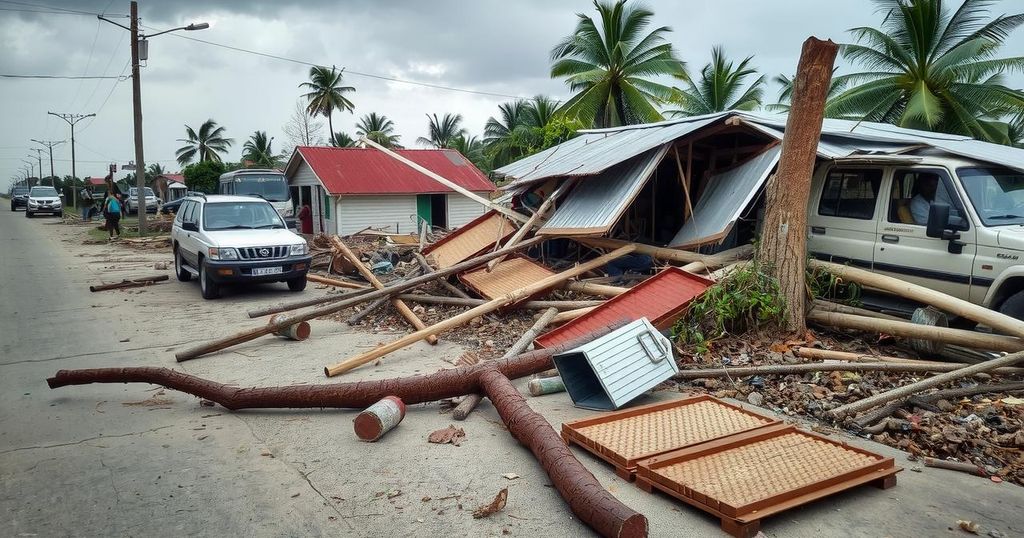World news
AFRICA, ATLANTIC OCEAN, CABO DELGADO, CHI, CHIURE, EMERGENCY RELIEF, EMERGENCY RESPONSE, INDIAN OCEAN, ISA, ISADORA ZONI, ISLAMIC STATE, MECUFI, MOZAMBIQUE, NATIONAL INSTITUTE FOR NATURAL DISASTERS, NATURAL DISASTER, NATURAL DISASTERS, UNITED NATIONS, UNITED NATIONS ’ REFUGEE AGENCY, UNITED NATIONS OFFICE FOR THE COORDINATION OF HUMANITARIAN AFFAIRS, ZONI
Ethan Kim
0 Comments
Cyclone Chido Causes Rising Death Toll and Devastation in Mozambique
Cyclone Chido has resulted in at least 75 fatalities and significant destruction in Mozambique’s Cabo Delgado province, exacerbating the challenges faced by a region already impacted by an insurgent conflict. Rescue operations are ongoing, revealing widespread devastation to infrastructure and displacing more vulnerable populations. The catastrophic weather events underscore the increasing risks associated with climate change in the area.
The death toll from Cyclone Chido in Mozambique has tragically increased to 75, nearly doubling prior figures, as rescue efforts continue in the aftermath of the storm. Striking the northern province of Cabo Delgado, where an ongoing insurgency has displaced many residents, the cyclone caused devastating destruction. Authorities report that the storm has claimed 69 lives in this province alone and left 740 others injured.
As rescue personnel navigate impeded rural routes, there are disturbing reports of total devastation. In Mecufi district, where the cyclone’s impact was most severe, “utter destruction” has been observed, with buildings flattened and essential services disrupted. Isadora Zoni, a reporting officer for the United Nations Refugee Agency, stressed the dire conditions, stating that images depict complete devastation of infrastructure including the local maternity clinic and schools.
Cabo Delgado province, already grappling with a humanitarian crisis due to insurgent conflict, is now facing compounded challenges as survivors deal with the aftermath of climate-induced disasters. The cyclone, equivalent to a Category 3 hurricane with wind speeds reaching 115 mph, also impacted Mayotte, claiming at least 31 lives. The sequence of tropical storms exemplifies the urgent threat climate change poses to vulnerable nations such as Mozambique.
Historically, Mozambique has faced recurrent weather-related calamities, highlighted by last year’s severe storm, Tropical Cyclone Freddy, which caused significant loss of life. As forecasts indicate the likelihood of a harsh rainy season ahead, marked by potential cyclones and flooding, the implications for an already strained population are grave. The U.N. refugee agency estimates that nearly 140,000 individuals have been displaced by extreme weather events in recent years, underscoring the pressing need for humanitarian assistance and intervention in the region.
Cyclones frequently affect Mozambique, contributing to a humanitarian crisis exacerbated by ongoing conflicts and climate change. The situation in Cabo Delgado province is particularly acute due to years of violence from insurgent groups linked to the Islamic State, displacing hundreds of thousands. Prior storms like Cyclone Freddy and Cyclone Gombe illustrate the frequency of weather-related tragedies in this region, highlighting the vulnerabilities faced by the local population.
Cyclone Chido has had a catastrophic impact on Mozambique, claiming multiple lives and causing extensive destruction in Cabo Delgado province, which is already struggling with the effects of prolonged conflict. This situation emphasizes the urgent need for support and resilience-building in regions that are increasingly vulnerable to both human-induced and climate-related crises. With forecasts indicating harsher weather patterns, the urgency for disaster preparedness and response is more pressing than ever.
Original Source: www.nytimes.com




Post Comment